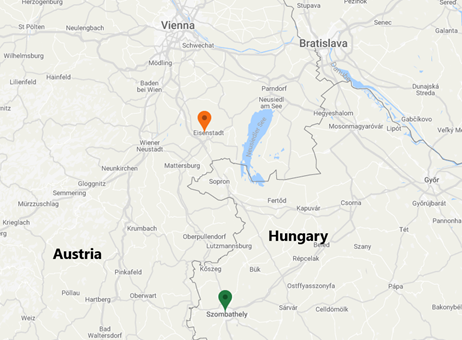What?
The Fairwork project is a cross-border initiative seeking to shed light on the challenges faced by commuters in the cross-border region comprising Burgenland in Austria and Western Hungary. The labour market in this region is characterised by a high number of Hungarian workers who commute daily across the border. This is caused by the considerable wage differences coupled with the short distance, encouraging up to 40.000 workers to commute to Eastern Austria every day. The trend has slowed down in recent years, but numbers remain high.
The project aims to improve cooperation between the labour market authorities of Austria and Hungary as well as between workers and the authorities, in order to facilitate procedures and the exchange of information by reducing communication hurdles. Indeed, commuters do not fall under classical definition of a migrant, as they do not change their place of residence but are just insured in another country through their job. In addition, many of them only work seasonally across the border, so their social status changes several times a year. This means that the relevant social security, taxation and labour regulations are not always the competence of one country and workers often struggle to understand which national framework they should comply with. However, many of these problems could be eliminated by:
- Raising commuters’ awareness about their rights and obligations
- Improving coordination between relevant labour market authorities
To achieve these goals, the project included activities in two directions: on the one hand, institutional capacity-building, and on the other hand, information measures.
Who?
The partnership is made up of two partners: the Austrian Federation of Trade Unions (LP) and the Hungarian Trade Union Confederation.
Where?

How?
The project has been co-financed in the framework of the Interreg V-A Austria-Hungary with an ERDF contribution of about €785.000, under priority axis 4, “Enhancing institutional capacity and an efficient public administration”.
Results
The project activities started with a collection of up-to-date information on the labour market situation and of the challenges related to cross-border commuting. A survey was conducted among cross-border commuters, but workers in Hungary who commute within the country were also interviewed. In this way, the project was able to compare the responses of cross-border commuters with those of regular commuters. Representatives of authorities and institutions dealing with cross-border issues in their work were interviewed as well. The results of these surveys and interviews were gathered in a study on cross-border commuting in the region, which provided inputs for future measures.
Furthermore, labour market authorities and institutions in the border region established regular working groups. During their meetings, jointly agreed topics and challenges were addressed with experts in the respective subject areas, and proposals for their solutions were agreed. Institutional cooperation dealt with issues such as social security, family benefits, cross-border taxation of wages, pension insurance, unemployment insurance, and employee protection. These topics were chosen either because they were a burden for cross-border workers or a challenge for authorities. As for dissemination of the outcomes, solutions were directly presented to the cross-border commuters or promoted within companies with the support of relevant institutions.
Enhanced coordination can only be achieved through a cross-border approach. Regardless of whether it is health insurance, pension insurance, or another issue, both the country of residence and the country of insurance are relevant for cross-border commuters. A lack of communication has often hindered the integration and effectiveness of cross-border employment, which became painfully evident during the Covid-pandemic in 2020. As cross-border employment is an issue in all border regions in the EU that have daily commuters, the project has the potential to be replicated across all borders.
More information
https://www.interreg-athu.eu/fairwork/
https://www.interreg-athu.eu/fileadmin/be_user_uploads/Fairwork/studie-2018-01-de.pdf
- Conectați-vă pentru a adăuga observații
- Etichete
- employment transport green deal

